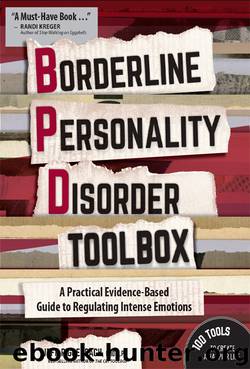Borderline Personality Disorder Toolbox: A Practical Evidence-Based Guide to Regulating Intense Emotions by Jeff Riggenbach

Author:Jeff Riggenbach
Language: eng
Format: epub
Tags: Borderline Personality Disorder Toolbox: A Practical Evidence-Based Guide to Regulating Intense Emotions
Publisher: PESI Publishing & Media
Published: 2016-09-06T16:00:00+00:00
COGNITIVE DISTORTIONS
Use this to identify the most common distortions in your thinking.
1. Rationalization. In an attempt to protect yourself from hurt feelings, you create excuses for events in life which don’t go your way or for poor choices you make. “It’s OK for my husband to be abusive because he just doesn’t know how to show his love, and besides, he only did it twice.”
2. Overgeneralization. You see a single negative event as applicable to all or no situations. You put people or things in categories based upon your personal experience. “I’ve been married three times and all three men were abusive, so every man on the planet is violent.”
3. All-or-nothing thinking. This refers to a tendency to see things in black and white categories with no consideration for grey. You see yourself, others, and often the whole world in only positive or negative extremes, rather than considering that each may instead have both positive and negative aspects. For example, if your performance falls short of perfect one time, you see yourself as a total failure.
4. Discounting the positive. You reject positive experiences by insisting that they “don’t count” for one reason or another. In this way you can maintain a negative belief that is contradicted by your everyday experiences. You reject compliments thinking (and sometimes saying), “It’s not a big deal; anyone could have done that.”
5. Fortune-telling. You anticipate that things will turn out badly and you feel convinced that your prediction is already an established fact. This belief may result from negative experiences in the past. However, just because something ended a certain way in the past does not mean it will this time. “I know I am not going to get this job, so I will not even apply.”
6. Mind-reading. You arbitrarily conclude that someone is reacting negatively to you, and you don’t bother to check this out. This belief is based on past interactions with others, and fails to consider that each person and situation is different and unique, and that you are different now as well. “She is probably upset with me.”
7. Should statements. You place false or unrealistic expectations on yourself or others. When we “should” others, the emotional consequence is anger (“He shouldn’t be going slowly in the fast lane!”). “Shoulding” ourselves may lead to guilt (“I shouldn’t have said those mean things to my mom.”).
8. Emotional reasoning. You assume that your negative feelings reflect the way things really are. “I feel it, therefore it must be true.”
9. Magnification. You exaggerate the importance of things such as mistakes made by you or others. This is often referred to as ‘blowing things out of proportion’ or catastrophizing. “I didn’t get this job, so I will never get a job and my kids will die of starvation.”
10. Personalization. You see yourself as the cause of some external negative event for which, in fact, you were not primarily responsible. “It’s my fault she is unhappy.”
Download
This site does not store any files on its server. We only index and link to content provided by other sites. Please contact the content providers to delete copyright contents if any and email us, we'll remove relevant links or contents immediately.
Should I Stay or Should I Go? by Ramani Durvasula(6825)
Why We Sleep: Unlocking the Power of Sleep and Dreams by Matthew Walker(5678)
Fear by Osho(4109)
Flow by Mihaly Csikszentmihalyi(4078)
Rising Strong by Brene Brown(3798)
Why We Sleep by Matthew Walker(3796)
Too Much and Not the Mood by Durga Chew-Bose(3707)
How to Change Your Mind by Michael Pollan(3696)
The Hacking of the American Mind by Robert H. Lustig(3598)
Lost Connections by Johann Hari(3465)
He's Just Not That Into You by Greg Behrendt & Liz Tuccillo(3324)
Evolve Your Brain by Joe Dispenza(3069)
What If This Were Enough? by Heather Havrilesky(2952)
Resisting Happiness by Matthew Kelly(2899)
Crazy Is My Superpower by A.J. Mendez Brooks(2878)
The Courage to Be Disliked by Ichiro Kishimi & Fumitake Koga(2819)
The Book of Human Emotions by Tiffany Watt Smith(2786)
Descartes' Error by Antonio Damasio(2757)
In Cold Blood by Truman Capote(2702)
